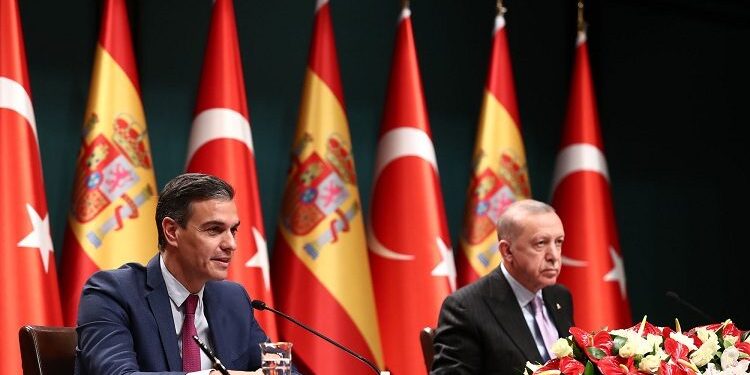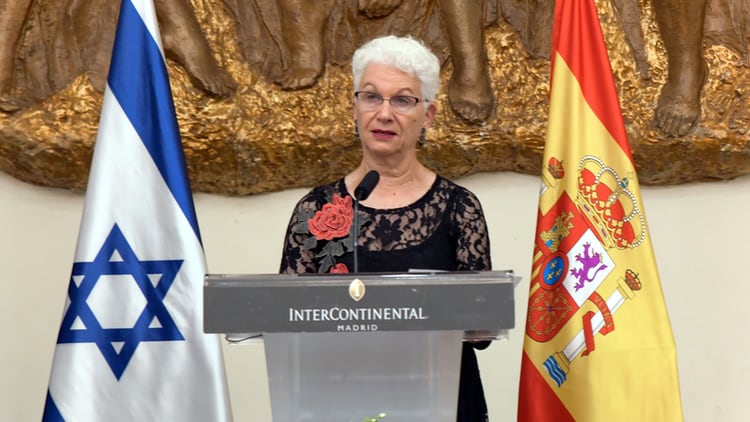The Diplomat
The various open fronts that Turkey has with France in the Mediterranean could help strengthen Spain’s role as a mediator in the conflicts in the Eastern Mediterranean, Libya and the Maghreb and even facilitate its influence in West Africa.
These are some of the conclusions of the report Turkey’s Foreign Policy in the Mediterranean: conflict and continuity, prepared by Marc Saurina, a researcher at the Alternativas Foundation, and which was made public last Friday.
According to the study, Turkish foreign policy has strained relations with several EU member states, specifically with Greece and Cyprus, which have confronted Turkey over the delimitation of waters and the control of hydrocarbons, and with France, which has several open fronts with Turkey: In the Aegean and Eastern Mediterranean, over its support for Greece and Cyprus; in Libya, with its political support for the Libyan National Army (LNA) – also backed by Egypt, Russia and Saudi Arabia, among others, while Ankara supports the Government of National Accord (GNA); and in the Western Sahel, due to the increased Turkish presence in both Niger and Mali, which challenge French leadership in that area.
Turkey’s presence throughout the Mediterranean is conditioning the European Southern Neighborhood Policy, since the different role played by Ankara in each Eastern Mediterranean country implies the need to adapt the appropriate European policy to each case based on the characteristics of each country and the role played by other actors, in this case Turkey.
Likewise, there is no consensus in the EU on relations with Turkey. Turkey’s authoritarian turn hinders the possibility of reaching an agreement, but the deadlock in negotiations has had negative effects on the pressures that the EU can exert on Ankara, since it has pushed Turkey to adopt a more assertive foreign policy independent of the EU. Germany and Spain advocate diplomacy and dialogue with Ankara, and have made moves in that direction. Likewise, Italy’s interests coincide with Turkish interests in Libya and the Maghreb, and there is also an alignment between Turkish and Spanish interests in the Sahel and West Africa.
In these circumstances, the report continues, relations between Spain and Turkey, intensified on the economic level after the 2008 crisis (due to the search for new markets for a business sector that has been badly damaged domestically), stand out for their pragmatism and the search for common positions that benefit both countries. Spain has maintained, for years, a cordial relationship based on dialogue and mutual respect, as evidenced by the common initiative of the Alliance of Civilizations and the support Spain has always shown for Turkey’s accession to the EU.
Apart from this, Spain is not directly involved in the various fronts opened by President Recep Tayyip Erdogan, which, together with the greater presence of Spanish companies, has marked Spain’s neutrality in Turkish tensions with other European partners. Spain has always tended to highlight the positive aspects of relations with Turkey, which it continues to see as a strategic partner, and the various Spanish governments have not interfered in Turkey’s internal affairs either. On the other hand, Spain seems to be more aligned with Germany on the strategy to be followed in the Eastern Mediterranean and Spanish interests in Libya coincide with those of Italy and Malta, which are reluctant to establish sanctions, as requested by Greece and France.
For all these reasons, the report considers that Spain could act as a bridge in the whole Mediterranean, for mutual benefit and for the benefit of the European Union, facilitating consensus and including Turkey as part of future agreements and negotiations. Likewise, the confrontation between France and Turkey could reinforce Spain’s role as a mediator in the various open fronts, such as the Eastern Mediterranean, the Libyan conflict and bilateral relations between Morocco, Algeria and Tunisia. “Spain can position itself as an actor capable of demonstrating neutrality and gaining weight on the regional and international scene,” says Fundación Alternativas.
On the other hand, Spain could also intensify contacts with Turkey in West Africa, with the aim of gaining experience and designing penetration strategies for the business sector. The loss of influence of France and the relative success of Turkey in the region, with a lower economic capacity and a much more recent presence, are two factors to be taken into account in the coming years for the design of medium and long-term strategies.







